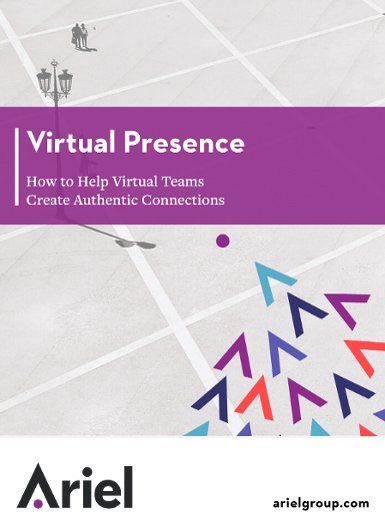4 Presence Skills Salespeople Need

You may be 100% honest with your client but something in your body language may be indicating otherwise thus diminishing your ability to build trust.
The most important skill for a salesperson is to build rapport and develop trust. In research surveys, it is always at the top of the list. (“Duh! Really?!? Tell me something I don’t know.”) If you are a sales professional, you know that in your gut. The question you need to ask yourself is: what comes before trust?
Presence.
Presence – the ability to connect authentically and build relationships that inspire forward action – is each salesperson’s key to developing trust. In sharpening your presence, you differentiate yourself from competitors and make more of a positive impact with clients.
Unfortunately, there is often lop-sided thinking from many sales professionals – and the leaders who manage them. Too much of the time there is an extra heavy focus on methodology and process. While methodology and process are important, and act as a helpful roadmap to good sales conversations, it’s our presence that activates those conversations, makes them memorable—and most importantly—impactful. Often, the competencies that make up presence are considered “soft skills” – and people assume that either you have them or don’t. However, there is a hard, objective way to teach people what presence is and how to develop it.
Here are four tactics that will take your presence from good to great and sharpen your skills in building rapport and developing trust:
Communicate Your Unique Value
Neuroscience research tells us that we make decisions about who we like, trust, and what we buy with the emotional part of our brain. If you want to build trust, share what you care about it, why you care, and what you uniquely bring to your clients. Various experts speak and write on this topic, the most famous, as of late, is Simon Sinek – the author and speaker who asserts that the best leaders, marketers, and salespeople “Start with Why.”
There are millions of Sales Representatives (or Sales Executives or Account Managers or Client Specialists, or whatever your title is) in the world. To distinguish yourself, figure out your why.
- Why do you care about being a salesperson?
- How do you approach a client relationship that is specific to you?
- What unique skills do you bring to your sales role?
- Why might your client care?
Answer these questions in a concise and compelling way. Then find ways to authentically communicate it to your clients.
Manage Your Physical State
In poker, everyone has a “tell” – an unconscious signal that you are bluffing. The reverse is also true: You may be 100% honest with your client but something in your body language may be indicating otherwise thus diminishing your ability to build trust. Identify and adjust any blind spots you may have in how you carry yourself – especially when meeting a new prospect or during challenging client conversations – that may be perceived as less than credible.
The Voice – It’s Not Just For Singers
Some research indicates that vocal tone (the intonation of your voice as you speak) accounts for less than half of the impact of your message. Often overlooked, your voice is a tool with which to carry emotion and meaning to better communicate your message. A quick short cut to using your voice is to focus on what you want your client to feel about your message. Make a specific choice: I want to warn/challenge/console/empower my client.
Do More Than Listen. Be Curious.
Everyone in sales talks about listening to client needs. No brainer. Now, build a deeper relationship by bolstering your curiosity. Tap into your inner child and keep asking why. Why do they have that need? Why is it important to them (or other stakeholders) to make a change? Why would a change be beneficial? Don’t be so quick to get to the “what” and “how.” Allow a deeper sense of curiosity to shift your listening to build a more authentic connection and add value by exploring the why behind your client’s needs.
These are just some of the tactics you can use to develop your presence and with them, clients will trust you enough to have a robust dialogue about their strategy and challenges. Then can you can weave in your methodology and process to take the relationship to the next stage.
Want to know about our Sales Presence product? Go here.
